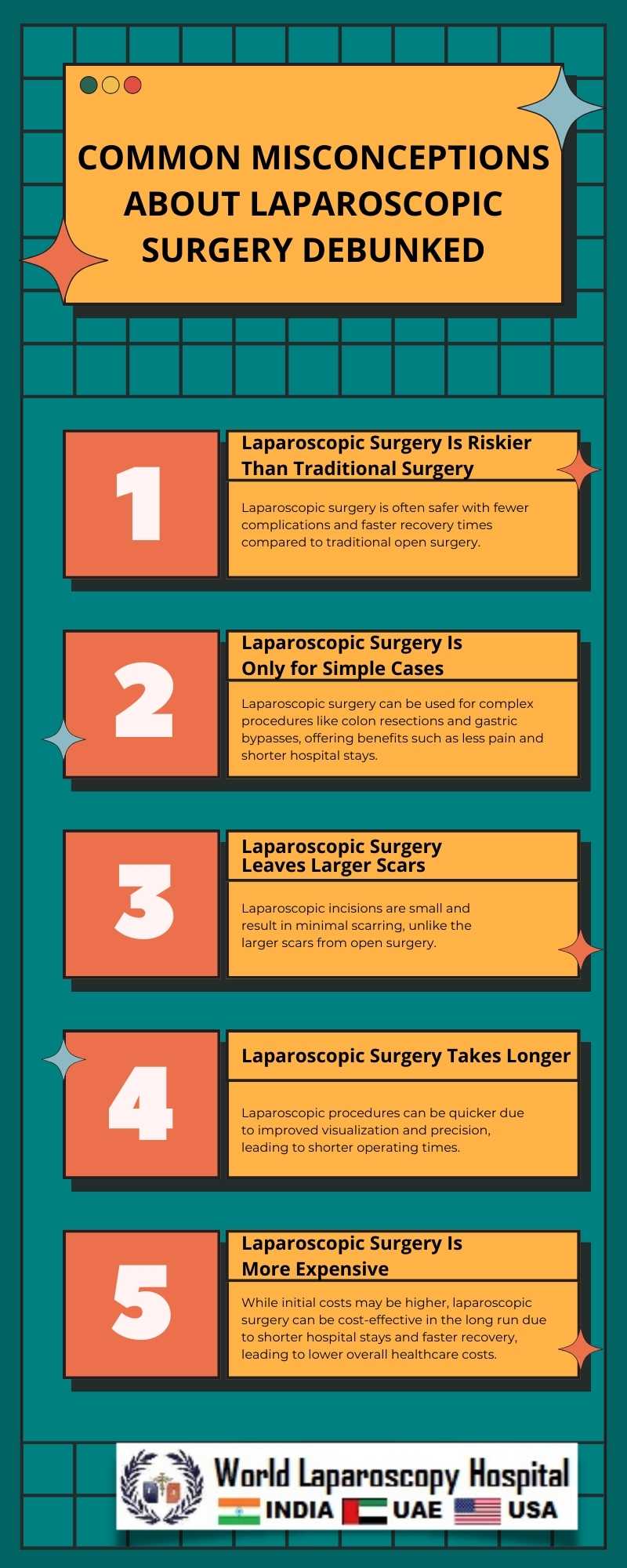Common Misconceptions About Laparoscopic Surgery Debunked
Introduction
Laparoscopic surgery, also known as minimally invasive surgery, has revolutionized the field of surgery with its benefits of smaller incisions, reduced pain, faster recovery, and minimal scarring. However, despite its widespread use and proven advantages, there are still some common misconceptions surrounding laparoscopic surgery that need to be debunked.

1: Laparoscopic surgery is riskier than traditional open surgery.
Debunked: Contrary to this belief, laparoscopic surgery is generally considered safer than traditional open surgery. The smaller incisions reduce the risk of infections and post-operative complications. Studies have shown that laparoscopic procedures have lower rates of surgical site infections, blood loss, and shorter hospital stays compared to open surgery.
2: Laparoscopic surgery is not suitable for complex procedures.
Debunked: While laparoscopic surgery was initially limited to simple procedures, advancements in technology and surgical techniques have made it feasible for complex surgeries as well. Surgeons can now perform intricate procedures such as colorectal resections, pancreatic surgeries, and complex gynecological surgeries using laparoscopic techniques with comparable outcomes to open surgery.
3: Laparoscopic surgery takes longer than open surgery.
Debunked: Although laparoscopic surgeries may initially require more time for set-up and preparation, the actual surgical time is often shorter than open surgery. The use of specialized instruments and advanced imaging technology allows surgeons to perform procedures efficiently, leading to reduced operative times in many cases.
4: Laparoscopic surgery is more expensive than open surgery.
Debunked: While the initial equipment costs for laparoscopic surgery may be higher than those for open surgery, the overall cost-effectiveness of laparoscopic procedures becomes evident in the long run. The shorter hospital stays, quicker recovery times, and lower rates of post-operative complications associated with laparoscopic surgery can result in lower healthcare costs and improved patient outcomes.
5: Laparoscopic surgery leaves more scars than open surgery.
Debunked: One of the key advantages of laparoscopic surgery is its cosmetic outcome, as it typically results in smaller and less noticeable scars compared to open surgery. The incisions used in laparoscopic procedures are usually 0.5 to 1.5 centimeters in length, leading to minimal scarring and improved aesthetic outcomes for patients.
Conclusion
Laparoscopic surgery has significantly transformed the field of surgery by offering patients safer, less invasive, and more cost-effective treatment options. It is important to dispel these common misconceptions about laparoscopic surgery to ensure that patients and healthcare providers are well-informed about its benefits and suitability for various surgical procedures.
Laparoscopic surgery, also known as minimally invasive surgery, has revolutionized the field of surgery with its benefits of smaller incisions, reduced pain, faster recovery, and minimal scarring. However, despite its widespread use and proven advantages, there are still some common misconceptions surrounding laparoscopic surgery that need to be debunked.

1: Laparoscopic surgery is riskier than traditional open surgery.
Debunked: Contrary to this belief, laparoscopic surgery is generally considered safer than traditional open surgery. The smaller incisions reduce the risk of infections and post-operative complications. Studies have shown that laparoscopic procedures have lower rates of surgical site infections, blood loss, and shorter hospital stays compared to open surgery.
2: Laparoscopic surgery is not suitable for complex procedures.
Debunked: While laparoscopic surgery was initially limited to simple procedures, advancements in technology and surgical techniques have made it feasible for complex surgeries as well. Surgeons can now perform intricate procedures such as colorectal resections, pancreatic surgeries, and complex gynecological surgeries using laparoscopic techniques with comparable outcomes to open surgery.
3: Laparoscopic surgery takes longer than open surgery.
Debunked: Although laparoscopic surgeries may initially require more time for set-up and preparation, the actual surgical time is often shorter than open surgery. The use of specialized instruments and advanced imaging technology allows surgeons to perform procedures efficiently, leading to reduced operative times in many cases.
4: Laparoscopic surgery is more expensive than open surgery.
Debunked: While the initial equipment costs for laparoscopic surgery may be higher than those for open surgery, the overall cost-effectiveness of laparoscopic procedures becomes evident in the long run. The shorter hospital stays, quicker recovery times, and lower rates of post-operative complications associated with laparoscopic surgery can result in lower healthcare costs and improved patient outcomes.
5: Laparoscopic surgery leaves more scars than open surgery.
Debunked: One of the key advantages of laparoscopic surgery is its cosmetic outcome, as it typically results in smaller and less noticeable scars compared to open surgery. The incisions used in laparoscopic procedures are usually 0.5 to 1.5 centimeters in length, leading to minimal scarring and improved aesthetic outcomes for patients.
Conclusion
Laparoscopic surgery has significantly transformed the field of surgery by offering patients safer, less invasive, and more cost-effective treatment options. It is important to dispel these common misconceptions about laparoscopic surgery to ensure that patients and healthcare providers are well-informed about its benefits and suitability for various surgical procedures.
2 COMMENTS
Dr. Aruna Giri
#1
Feb 14th, 2024 7:30 am
Laparoscopic surgery has revolutionized the surgical landscape, providing safer, minimally invasive, and cost-effective treatment options. Dispelling misconceptions is crucial to ensure patients and healthcare providers understand its benefits and suitability across various procedures.
Dr. Deepak Chauhan
#2
Feb 27th, 2024 6:12 pm
Laparoscopic surgery revolutionizes surgery, providing safer, less invasive, and cost-effective options. Dispelling misconceptions ensures patients and healthcare providers understand its benefits and suitability across various procedures, promoting informed decision-making for optimal outcomes.
| Older Post | Home | Newer Post |

